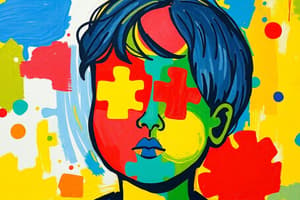Podcast
Questions and Answers
What are some early signs of autism that can be observed at 6 months of age?
What are some early signs of autism that can be observed at 6 months of age?
Few or no big smiles or other warm, joyful engaging expressions; Limited or no eye contact
At what age can autism be diagnosed according to the information provided?
At what age can autism be diagnosed according to the information provided?
Before age 2 ½ years old
What are some characteristics of autism as mentioned in the content?
What are some characteristics of autism as mentioned in the content?
- Echolalia
- Poor eye contact
- Inability to express verbally
- All of the above (correct)
Children with autism have difficulty differentiating themselves from the environment.
Children with autism have difficulty differentiating themselves from the environment.
Children with autism have an obsessive desire for ______.
Children with autism have an obsessive desire for ______.
Match the Level of Mental Retardation with its corresponding I.Q range and characteristics:
Match the Level of Mental Retardation with its corresponding I.Q range and characteristics:
What is one of the causes of ADHD in children mentioned in the content?
What is one of the causes of ADHD in children mentioned in the content?
ADHD affects 3-5% of all children.
ADHD affects 3-5% of all children.
What are some assessment characteristics of ADHD as mentioned in the content?
What are some assessment characteristics of ADHD as mentioned in the content?
Study Notes
Neurodevelopmental Disorders
Autism
- Difficulty communicating, incomprehensible, and echolalia
- Don't want to be hugged; usually stiffen when held
- Unable to differentiate self from the environment; talks about himself in third person
- Difficulty learning expressive communication, may exhibit echolalia or mutism
- No eye contact, engaged in self-stimulated acts, and plays alone for hours
- Turning to inanimate objects; attachment to inanimate object
- Obsessive desire for sameness, and may exhibit self-mutilation
- Head banging, tantrums, spinning, and running around
- Boys are more likely to be affected than girls (1:100 kids)
- Presents at birth or soon after birth, diagnosed before age 2½ years old
Causes of Autism
- Genetics
- Vaccines
- Environment
- Neurotransmitter abnormality
- Structural brain abnormality
Characteristics of Autism
- Echolalia
- Poor eye contact
- Can't express verbally
- Track in his own world
Early Signs of Autism
- 6 months: few or no big smiles, limited or no eye contact
- 9 months: little or no back-and-forth sharing of sounds, smiles, or facial expressions
- 12 months: little or no babbling, no back-and-forth gestures like pointing, showing, reaching, or waving
- 16 months: very few or no words
- 24 months: very few or no meaningful, two-word phrases
Mental Retardation
- Below average intellectual functioning accompanied by significant limitation in adaptive functioning
- Onset: before 18 years old
- Causes: maternal infection, exact gestational age not reached (premature), nutritional deficiency, toxoplasmosis, anoxia, lead poisoning, measles, environmental factors, thyroid deficiency, and AIDS
Assessment of Autism
- A - Appearance: neat, obsessive-compulsive, wants constancy, flat affect
- B - Behavior: ritualistic behavior, repetitive, and may exhibit self-mutilation
Attention Deficit Hyperactivity Disorder (ADHD)
- Characterized by inappropriate degrees of inattention, overactivity, and impulsivity
- Also known as "HYPERKINESIS" or "Minimal Brain Syndrome"
- Can progress to conduct disorder to antisocial behavior
- Onset: 7 years old and below, duration: 6 months and above
- Affects 3-5% of all children, 3-4 times more common in boys than girls
Etiology of ADHD
- Lower level of activity in some parts of the brain
- Mother's use of cigarette, alcohol, or other drugs during pregnancy
- Tends to run in families → genetic influence
- Decrease dopamine
Assessment of ADHD
- A - Dirty
- B - Clumsy, impatient, no focus, easily distracted, hyperactive
- C - Talkative
- Inattention: hard time keeping their mind on any one thing
- Hyperactivity: always seen to be in motion, can't sit still
- Impulsivity: do not seem to think before they act
Studying That Suits You
Use AI to generate personalized quizzes and flashcards to suit your learning preferences.
Description
This quiz covers disorders of childhood, specifically autism, including communication difficulties and behavioral characteristics.




